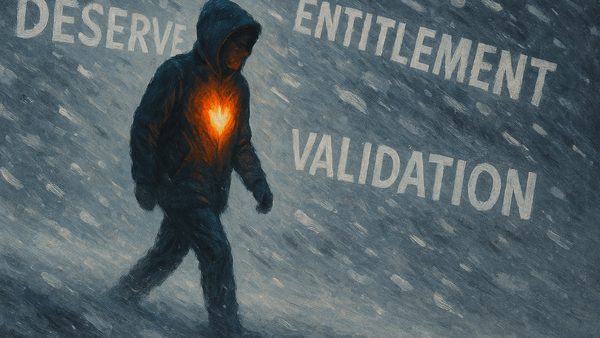The Price of Morality
How socialistic forms of state lure you to adopt easily accessible high moral standards in order to secretly bill you later. Break the cycle and become a solitaire.

If we let someone else make a decision for us and it turns out it’s not beneficial, we typically feel upset, abused, cheated or infuriated. If we make a conscious decision, based either on an overarching elaborate assessment of the situation and all its potential options, scenarios, and consequences or simply our intuitive gut feeling and it turns out to be a failure, we might experience similar feelings but are generally much more capable of processing and integrating them. Often we don’t even perceive these feelings as detrimental and rather experience contentment and completeness.
The difference is that in the latter scenario, we own our decision and accept responsibility for its consequences because we aligned it with our own moral standards that we can afford to have, whereas in the first scenario, we give our power away and surrender to someone else’s moral standards.
Morality is the concept of differentiation of intentions, decisions, and actions between right and wrong, which can manifest in standards or principles derived from the code of a specific religion, culture, or philosophy.
Bearing Morality’s Costs
Every decision is ultimately a moral marginal decision that every individual has to make using their own resources. In other words, your integrity, trustworthiness, assertiveness, self-confidence, and emotional stability depend on whether you have chosen moral standards you can afford.
If the costs of resources for moral standards are collectivized, for instance through some form of social cost splitting or apportionment procedure, everyone can afford any moral standard, no matter whether it is reasonable or not.
The moment you subscribe to such societal standards you’re being stripped of your integrity. Why? Because you raise your moral standards as soon as the burden of their directly related costs seem to vanish. In that very instant you give up your freedom and become dependent on the collectivizing system to uphold your raised morality whose costs you individually can’t afford anymore.
Additionally, moral standards represent an essential aspect of our belief system and self-perception. People even identify themselves with these standards, which then become an integral part of their being. That means, if you have adopted a certain morality whose costs you can’t bear, which was only made possible by entering a collectivizing entity, you have become a slave of the system that provides the cost splitting.
Moral Marginal Decisions
For example, it is not reasonable to provide old and sick people with overly expensive medical treatments suitable for prolonging their lives by one year, if this entails children not being permitted to go to school for a year as a result of government measures on a political agenda.
Nevertheless, anyone is free to adopt this moral standard, as long as they’re capable of individually bearing its costs. Therefore, if an old sick person wants to prolong his life using his own money and resources instead of investing in the upbringing of children or at the expense of his own offspring’s education, that is absolutely fine. After all, it is a direct expression of free will. However, he has to bear this moral consideration individually himself.
The limitations of moral bandwidth are thus one’s own resources. If these limitations are now effectively abolished by collectivizing the costs, the process of consideration degenerates, and decisions are made that are no longer in the overall interest of the population.
Manifestations of Morality’s Costs
Heath Ledger aka The Joker in The Dark Knight brings it to the point:
Their morals, their code … it’s a bad joke. Dropped at the first sign of trouble. They’re only as good as the world allows them to be. You’ll see—I’ll show you ... when the chips are down, these civilized people … they’ll eat each other. See, I’m not a monster … I’m just ahead of the curve.
He refers to the very phenomenon that people adopt moral standards they can’t afford. The only entity that allows them to have these raised morals and codes is the collectivizing system they’ve become slaves of.
Costs of moral standards come in many different forms. Here are a couple of examples:
- It’s easy to eat cheap chicken bought in the supermarket if you don’t have to raise the animal under devastating low-cost conditions and kill it yourself.
- It’s easy to advocate for a government vaccination program if it grants your children the right to go to school and yourself the right to travel.
- It’s easy to advocate war in Ukraine and be against Russia when you don’t have to fight in the war yourself or offer personal living space for refugees.
- It’s easy to be pro-abortion if you don’t have to pay for the procedure, nor perform it yourself, and on top of that spare the costs of raising the child.
- It’s easy to not exercise at all, get drunk weekly, and binge on junk food if public health insurance pays for treatment of any condition you might develop.
- It’s easy to advocate for women’s, children’s, and other social groups’ rights if this grants you privileges through quota in companies and universities, financial funding, and other benefits and limits the demands on your personal contribution to society.
- It’s easy to advocate for the expropriation of Jews in Germany if that secures your job, the new highways are built with their money and you don’t have to knock on your neighbor’s door yourself and claim their possessions.
- It’s easy to advocate for the restriction of CO2 emissions and actions to combat climate change as long as you don’t have to turn off your own heating, TV, or favorite online shopping site or stop eating imported avocado, driving to work with motorized vehicles, or going on vacation in Italy, the Caribbean or Thailand.
What people don’t realize is that they indeed bear the costs for their adopted moral standards. Collectivization does not mean that morality becomes free or its costs miraculously disappear. It’s like buying a flatscreen TV in four easy installments. The act of purchase is easy but the burden is heavy. You pay for your morals. Always.
It comes in the form of lowered standards in education and infrastructure, of shortages of teachers and other skilled labor. It comes in the form of declining levels of inner security and inflation of currency. It comes in the form of increasing prices of consumer goods, rising taxes, and new fees. It comes in the form of rising stress levels and less leisure time. It comes in the form of limitation of freedom and restriction of formerly granted rights.
Breaking the Chains of Collectivized Costs
Any moral standard needs to be cultivated on the level of the individual. Don’t adopt any moral standard you’re not willing to pay for. It’s the attribute of a slave’s mind. If you want to be truly free, you have to make a full assessment of your morality, its (hypothetical) individual costs, and whether or not you are able and willing to bear these costs.
- If this is the first time you think about this very topic you most likely don’t know what your beliefs and standards are. Grab a pen, title a piece of paper with “My choices of beliefs and moral standards” and jot down everything that comes to your mind. You will probably get a surprisingly long list.
- Separate the items with collectivized costs from the ones without. At first, they might be hard to distinguish. Items with collectivized costs are beliefs and standards that are typically advertised through mainstream media, easily accessible with a simple narrative, highly polarizing and emotionally triggering, and provide a clear suggestion to categorize right and wrong. Additionally, adopting the advertised higher morality is being rewarded with specific benefits over the group of people who refuse to adopt the new standard. At times, the non-adopting group of individuals is being punished, if the collectivizing entity has the power and the means to do so. For the dominating entity to collectivize costs it requires a substantial amount of individuals to adopt the same morality about a specific subject, which they wouldn’t naturally carry if it weren’t marketed to them. Items without collectivized costs are typically the ones that represent purely individual beliefs about right and wrong or such that are shared within smaller groups. They are less polarizing and emotional and bear little social risk if exchanged.
- Evaluate the rough individual costs of each of your items.
Items without collectivized costs: Here are a few questions you can ask yourself to make rough estimations.
→ How much money is it per month?
→ What’s your energy investment?
→ What’s your time investment?
→ What’s your emotional investment?
→ In which dimension does it serve or hinder your goals?
Items with collectivized costs: Collectivizing costs of morality is a business model in itself. Since the costs for the higher moral standard initially do not manifest on the level of the individual and are collectivized and billed to you later through intransparent mechanisms, it is tough to make estimations. The question to ask here is the following.
→ Which hypothetical costs would you bear on your individual level if the specific moral standard were of purely personal concern to you without any societal significance? For instance, what measures would you personally take to reduce your CO2 emissions to zero, respectively to create a neutral carbon footprint, if that were solely of your personal concern and society had no interest in that topic whatsoever? - Finally, check item by item whether you are able and willing to bear the identified costs.
This small exercise is meant to give you clarity and provide your mind with perspective. To help you plant seeds for change.
To become truly free means to pay the price for the morality you apply to yourself and the world. Only this makes you a solitaire, an authority of strength and guidance.
Did you enjoy this article? Please consider contributing to this publication’s financial freedom.
Flows straight into content, not coffee.




